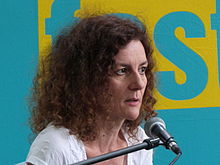Christof Prick is a German orchestra conductor. He uses the name Christof Perick in English-speaking countries. His father was the concertmaster of the Hamburg Philharmonic.

Max Herbert Eulenberg (1876–1949), was a German poet and author born in Cologne-Mülheim, Germany. He was married from 1904 to Hedda Eulenberg.
Nicolas Stemann is a German theatre director. He is best known for directing the 2002 stage production of Hamlet at Schauspiel Hannover, a theatre in Hanover.
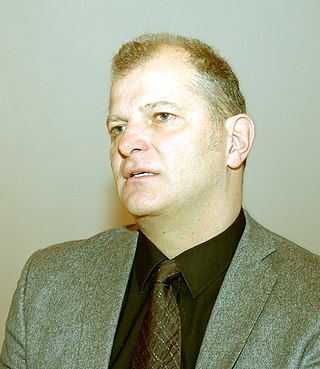
Martin Kušej is an Austrian theatre and opera director, and is director of the Burgtheater Vienna. According to German news magazine Focus, Kušej belongs to the ten most important theatre directors who have emerged in the German-speaking world since the millennium. He is considered one of the most important directors working today, acclaimed for his dark and incisive productions.
Radikal jung – Das Festival junger Regisseure is an annual weeklong German theatre festival at the Münchner Volkstheater, Munich. It began in 2005, as a forum and stage for the next generation of directors.
Mülheimer Dramatikerpreis, founded in 1976, is one of the leading theater awards in Germany. It is awarded by an open jury of theater professionals, critics and playwrights who watch a short list of productions during the Stücke festival; the productions are not the full play but a piece, often the first act. The short list is chosen by a jury from plays that were first performed in Germany during the prior season. The winner receives €15,000.
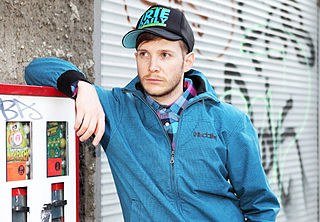
Nis-Momme Stockmann is a German writer and theater director. His work includes plays, radio plays, prose, essays and poetry. He also teaches dramaturgy and scenic writing at the Zurich University of the Arts and at the Academy of Arts in Ludwigsburg.
Anjorka Strechel is a German film and theater actress. Her television credits include Polizeiruf 110 and Tatort. Her film credits include My Friend from Faro and The Edge.
Kolja Schallenberg is a German director and playwright.
Jürgen Holtz was a German actor on stage and in film, and an artist and author. On stage he played leading roles in East Berlin, including with the Berliner Ensemble, and from 1983 in the West, in both classics such as Shakespeare and Brecht, whose Galileo he played at age 86, and contemporary theatre, such as the title role in the premiere of Moritz Tassow by Peter Hacks. In film, he played leading roles such as Egon Schultz in Ari Folman's Made in Israel. He received several awards including the Theaterpreis Berlin and the Konrad Wolf Prize.

Hanover Drama is a theatre company in Hanover, the state capital of Lower Saxony, Germany. The company is resident at the Hanover Playhouse situated approximately 200 metres (660 ft) east of Hanover Opera House, and the Ballyard situated approximately 530 metres (1,740 ft) west-southwest of the opera house in the old town. Collectively these venues have five stages:

Maya Arad Yasur is an Israeli playwright. Yasur's works have been produced worldwide, translated to over thirteen languages and are published in Chinese, English, French, German, Hebrew, Russian, Italian and Polish. She is the recipient of the Theatertreffen's Stückemarkt prize 2018. Yasur is known for her knotty and complex form of fractured narratives.
Günter Krämer is a German stage director, especially for opera, and a theatre manager who has staged internationally.
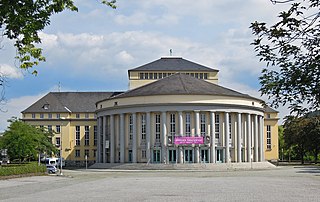
Theater Saarbrücken, officially Saarländisches Staatstheater since 1971, is the state theatre of Saarland in its capital Saarbrücken, Germany. It has several divisions and offers annually around 30 new productions in around 700 events for more than 200,000 people. Its venues are Großes Haus, Alte Feuerwache, Congresshalle and sparte4. While theatre in Saarbrücken has a long history, the present main venue was completed in 1938, with plans commissioned by the Nazi regime.
Alfred Kirchner is a German actor, theatre director and theatre manager who is based in Berlin. He worked at theatres such as Theater Bremen, Schauspielhaus Bochum, the Burgtheater in Vienna and the Staatliche Schauspielbühnen Berlin, before turning to freelance work. He has staged productions in Europe and North America, including several world premieres of both drama and opera. He directed the premiere of Martin Walser's Ein Kinderspiel in Stuttgart in 1971, the U.S. premiere of Henze's We Come to the River at the Santa Fe Opera in 1984, and the premiere of Hans Zender's Stephen Climax at the Oper Frankfurt in 1986. In 1994, he staged Wagner's Der Ring des Nibelungen at the Bayreuth Festival.
Ulrich Windfuhr is a German conductor.

Die Schutzbefohlenen, is a play by Elfriede Jelinek written in 2013. She termed it a Sprachkunstwerk, a language artwork. It deals critically with the politics at the time concerning refugees. The play was first read in Hamburg on 21 September 2013. The first scenic production was in Mannheim on 23 May 2014. The first production in Austria was staged at the Burgtheater in Vienna on 28 March 2015, which was recognised internationally. Later that year, Jelinek expanded the text to reflect the changed political situation.
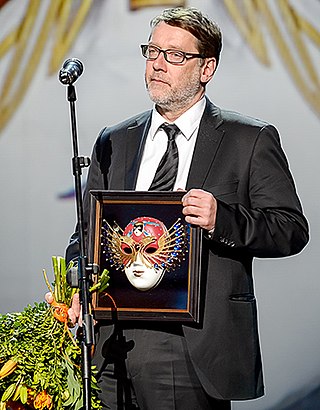
Michael Thalheimer is a German theatre director.

The Theater am Aegi is an event venue on Aegidientorplatz square in Hannover, the capital of Lower Saxony, Germany. Like the square, it is often referred to as Aegi. The building was opened in 1953 mainly as a cinema, with a versatile stage also for other performances. It has been a Gastspieltheater for local and touring companies, without its own personnel. After a fire, it was rebuilt as a theatre only, opened in 1967, and then mainly as a venue for drama performances of the state-run Staatstheater Hannover. After a new theatre was built for that company in 1992, Theater am Aegi returned to its traditional role of a venue for various events, including congress, private functions and representation of the city.
Kristo Šagor is a German playwright and director. He has received numerous awards, and his plays Dreier ohne Simone, FSK 16 and Trüffelschweine are now among the most frequently performed plays in German-speaking countries.
